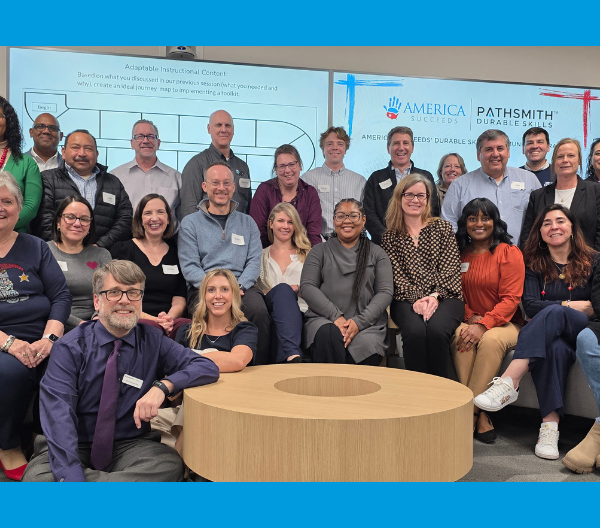In a world where rapid technological changes and evolving business landscapes are the norms, there remains a constant and yet often overlooked asset: our military veterans. With their unique blend of discipline, adaptability, leadership, and teamwork, veterans bring invaluable durable skills to the workforce. Yet, data suggests that more than 15% of veterans (2.4 million people) are at risk of underemployment after their service concludes.
Why is this happening? How can we better support veterans in the workplace? In this blog post, we discuss this topic and share tangible solutions. Let’s dive in.
What Veterans Face After Service
When service members transition from the military to civilian life, they face a landscape that’s drastically different from the structured and mission-driven world they’ve grown accustomed to. Despite the military’s reputation for producing highly skilled, adaptable, and disciplined individuals, many veterans find the shift to a civilian career path fraught with obstacles and misunderstandings.
For veterans, the struggle is twofold: on one hand, there is the personal challenge of redefining one’s identity and purpose outside the military framework. On the other hand, there’s the external challenge of navigating a job market that often fails to recognize or understand the full value of military experience. Veterans possess a wealth of durable skills — leadership, teamwork, problem-solving, and a proven ability to learn quickly under pressure, to name a few. Yet, these skills can be lost in translation without the common language of civilian job experience and credentials.
A Training Rooted in Translatable Durable Skills
Durable Skills such as leadership, teamwork, adaptability, and problem-solving are the bedrock of military training. These are coupled with unwavering discipline, a sharp focus on the objective, and the ability to operate effectively under pressure. Beyond this, technical proficiencies are honed across various operations—from logistics and cybersecurity to advanced machinery operations and information technology.
Employers often misunderstand the vast repertoire of skills that veterans possess. Contrary to the perception, veterans aren’t just seeking managerial roles straight out of service–although some of them are equipped with the skills to fill those roles seamlessly–they are eager to contribute in various capacities. The challenge? Aligning recruitment strategies, and training curriculums, with actual workplace needs.
Translating Military Skills to the Civilian Workforce
In the civilian workforce, the competencies veterans possess can be instrumental. Their leadership qualities make them effective managers, capable of steering teams with a clear vision. Their adaptability means they can quickly get up to speed in dynamic environments or industries undergoing rapid changes.
The problem-solving abilities and decision-making skills developed on the battlefield are directly transferable to corporate strategy and crisis-management roles. Furthermore, their technical skills, be it in IT, machinery, or logistics, can be seamlessly integrated into sectors as varied as tech, manufacturing, supply chain management, and beyond. Essentially, a veteran’s training prepares them for multifaceted roles, offering a holistic approach that is often missing in traditionally trained employees.
However, because many veterans don’t hold a four-year degree or have a traditional resume trajectory to show off, these skills often go unrecognized in the hiring process.
Military Spouses: A Dual Challenge
The skills gap isn’t limited to veterans, with over 20% of military spouses experiencing unemployment. This is exacerbated by frequent relocations, which disrupt career continuity. Recognizing this, many training programs have expanded their mission to include military spouses, aiming to bolster women’s presence in tech. As military spouses navigate these employment challenges, legislation that recognizes credentials irrespective of state boundaries can be transformative.
Workforce Bias Towards Four Year Degrees
The workforce’s heavy emphasis on formal education, particularly the four-year college degree, has long been a critical filter in the hiring process. This bias tends to overlook the practical skills and unique experiences that veterans bring to the table. The underlying issue is a systemic one; it’s rooted in traditional hiring practices that can’t seem to reconcile non-traditional career paths, like those of veterans, with the competencies needed in the modern workplace. The misconception that what veterans offer is mismatched with what employers believe they need creates a barrier for these skilled individuals to advance in their post-military careers.
Acknowledging the misconception is the first step. The next, and arguably more critical step, is for employers to adjust their lens through which they view potential. By realigning hiring protocols to prioritize durable skills and competencies right up there with traditional educational achievements alone, businesses can tap into the rich reservoir of veteran talent. In doing so, they not only gain employees with a unique set of skills and perspectives, but also contribute to a more equitable and diverse workforce that values a range of proficiencies.
As the conversation evolves, it’s essential to spotlight the strengths and capabilities that veterans bring to our businesses and communities. Through open dialogue, education, and a shift in perception, we can work towards a future where the transition from service to civilian employment is not just a hopeful aspiration but a seamless reality.
A Program Directly Addressing This Issue: VET TEC
The military is not just a disciplined force but a rigorous training ground that molds individuals into resilient, adaptable, and skilled professionals. Veterans emerge from service equipped with a unique blend of durable and technical skills that sets them apart. This sentiment is echoed by Alicia Boddy, the founder of VET TEC Working Group – In 2017, Congress approved VET TEC as a pilot program offered through VA Education Benefits. The Working Group is often described as a sister program to the Post 9/11 GI Bill and includes training providers, the VA, and Congress working together to ensure the success of the pilot program and provide recommendations for future iterations of VET TEC. Through this work, Alicia has been deeply rooted in efforts to transition veterans to civilian careers.
“Creating a separate employment pipeline for veterans is not the answer. They seek integration, not isolation,” said Alicia. “There is a pressing need for collaboration between traditional and non-traditional learning environments. It’s not just about offering training; it’s about ensuring that training is pertinent and bridges the durable skills gap.”
To do just that, VET TEC has worked to approve certificate schools to better align with the training employers need and expect from Veterans. Being one of the first schools approved under this initiative, Code Platoon—a 15-week coding bootcamp specifically tailored for veterans and military spouses—along with 24 others like Galvanize/HackReactor, Divergence Academy, ACI Learning, LEARN Academy, are creating opportunities to meet employers halfway and demonstrate the technical and durable skills they built during their service. With the VET TEC pilot program concluding soon, there’s a collective hope that the Senate will greenlight its extension, ensuring veterans continue to receive relevant training that matches market demands. We’re hopeful to see this program continue.
Rethinking Hiring Protocols & Valuing Diverse Backgrounds
While formal education is undoubtedly valuable, it’s imperative for companies to broaden their perspective. In a diverse world, hiring should reflect varied experiences and skills, not just academic milestones. Veterans, though they may lack a conventional degree, come with a wealth of practical experiences and skills that can’t be taught in classrooms. Similarly, individuals from vocational training backgrounds, apprenticeships, or non-traditional education paths offer unique perspectives and skills that can be invaluable to businesses.
To tap into this diverse talent pool, companies need to adapt their hiring protocols. This includes recognizing and valuing non-traditional credentials, creating job descriptions that focus on skills over degrees, and training hiring managers to look beyond the conventional. As Alicia says, “It also takes a leap of faith from the employer to do something they haven’t done before. I’d like to see more hiring managers take a chance on the veterans that I work closely with–I know they wouldn’t regret it.”
In doing so, businesses will not only diversify their teams but also gain employees with a broader range of skills, experiences, and perspectives.
America Succeeds recognizes the immense value veterans bring to the table. Their Durable Skills—forged in challenging terrains and high-pressure scenarios—are unmatched. It’s time employers, training providers, and credentialing organizations join forces to ensure these skills find their rightful place in the civilian world.
For a deeper dive into how durable skills are being championed, and to understand the genesis visit our Durable Skills website.




